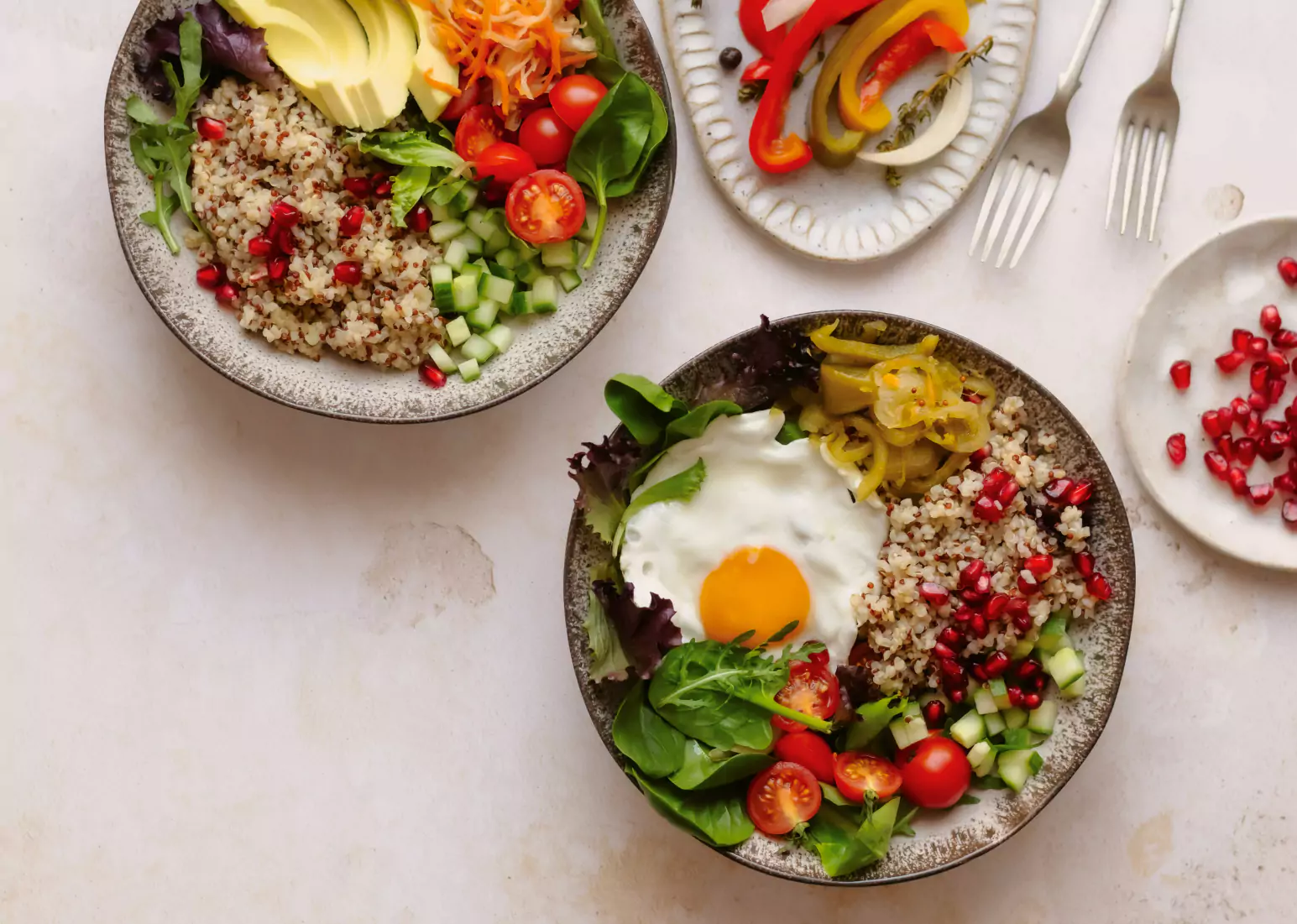Menopause Diet: Which Foods to Eat & What to Avoid

Key Takeaways
Menopause is an important transition in life, and it encompasses the hormonal changes that occur in people who menstruate for about a year after they have their final period. Chances are, if you’ve stumbled upon this article, you may be familiar with the symptoms of menopause or know someone experiencing them.
When it comes to women’s health, menopause is one of the most prominent changes that happens during life. However, this transition can cause a wide variety of unpleasant symptoms, which may vary depending on the individual.
While these changes can throw you for a loop, there are a few ways you can support your well-being during this transition through your diet.
In this article, we’ll uncover what happens during menopause, and share foods to include and avoid in a menopause-friendly diet.
What Happens During Menopause?
Symptoms Experienced During the Menopause Transition

During this period of hormonal instability and change in the body, you may experience one or more of the following menopausal symptoms:
- Hot flashes
- Weight gain, especially in the abdomen
- Headaches
- Night sweats
- Vaginal dryness
- Mood imbalances
- Fatigue
- Dysuria (difficulty in or feeling pain during urination)
While these changes are normal, there is research to support certain dietary changes you can make that may help alleviate some of these symptoms. But before we get into those, let’s have a look at what exactly is occuring in the body during the menopausal transition.
Changes in Estrogen and Progesterone Levels
Menopause is marked by many changes within the body. One of the most well-known changes is the declining levels of estrogen and progesterone.
During menopause, a form of estrogen called estradiol (or E2) starts declining during the menopause transition. The declining levels of estrogen can also contribute to age-related insulin resistance in menopausal women. Research also shows that lower levels of estrogen may be associated with increased abdominal obesity and unstable glucose levels.
Increase in Free Androgen Levels
Free androgen levels may also increase during this time. As estradiol levels drop off and sex hormone binding globulin (SHBG) decline, testosterone and the metabolism of other androgens may be altered. This can worsen risk for metabolic syndrome as well as symptoms such as hair loss and abdominal weight gain
Changes in FSH and Inhibin B Levels
Follicle-stimulating hormone (FSH) levels often begin rising years before menopause begins. However, the early menopausal transition may involve a sharp rise in serum FSH levels. Inhibin B is another hormone whose changes are in the spotlight at this time. This hormone plays a role in regulating ovarian function. As FSH levels rise, inhibin B levels fall.
5 Foods to Include In Your Menopause Diet
Although menopause can sometimes feel like a rollercoaster, a healthy diet can be a helpful way to support your lifestyle during this transition. Some studies, for example, suggest that a focus on foods with anti-inflammatory or antioxidant properties may be beneficial for cholesterol levels, blood pressure, and weight management in menopausal women.
Here are five types of foods that may be particularly helpful for a healthy lifestyle during menopause.
1) Fiber-Rich Foods

One of the prominent changes during menopause is the shift in estrogen levels. One way that may help support your body through this change, which as we mentioned can sometimes raise the risk of age-related insulin resistance, can be to eat more fiber-rich foods.
Research suggests that including adequate amounts of fiber in your diet may help improve insulin sensitivity. Fiber may also support improved glycemic control.Foods that are rich in fiber include:
- Whole grains
- Oats
- Legumes
- Leafy greens like broccoli
- Fruits such as apples and strawberries
- Nuts and seeds
Fiber can also be found in supplement form, although Nutrisense dietitians recommend getting your fiber from whole food sources.
2) Phytoestrogen-Rich Foods
Phytoestrogens are estrogen-type molecules that are derived from plant sources. They mimic estrogen made by the body and because of that they can, in theory, be used just like endogenous estrogen by your body.
Phytoestrogens encompass a diverse group of bioactive compounds that are produced by plants. There are four main groups of phytoestrogens: flavonoids (flavones and isoflavones), coumestans, stilbenes, and lignans. While phytoestrogens may not be optimal for everyone, there is some evidence to suggest that consuming phytoestrogens may support the body throughout menopause.
In fact, soy, a flavonoid phytoestrogen, is often used as an alternative to hormone replacement therapy and can help alleviate menopausal symptoms. Researchers have found that phytoestrogens can be especially helpful in reducing hot flashes in women who are experiencing menopause.
Phytoestrogens can also act as antioxidants, which may also help reduce harmful molecules that increase the risk of menopause-related complications (such as heart disease and osteoporosis).
There is some controversy around whether all women should be consuming more phytoestrogens. There is some research to suggest that these foods may have the potential to be endocrine disrupting, which may be a concern for individuals with hormone-related conditions such as PCOS or endometriosis.
Phytoestrogen-rich foods to consider include:

- Flaxseeds
- Edamame
- Soybeans
- Tofu
- Tempeh
- Sesame seeds
3) More Fruits and Vegetables
Although this may seem like a no-brainer, the reality is that some people consume fewer fruits and vegetables as they age. Some experts believe that this is linked to a gradual loss of your sense of taste and smell, which may lead you to consume foods that are hyper-concentrated in flavors (rather than nutrients) as you age
However, fruits and vegetable intake can provide additional fiber, phytoestrogen, and other beneficial nutrients for living well during menopause. Researchers investigating the benefits of fruit and vegetable intake found that an increase in fruit and vegetables was associated with reduced menopausal symptoms overall.
4) Olive Oil

If you’re familiar with the Mediterranean diet, it’ll come as no surprise that this diet may be beneficial for menopausal women who want to manage their weight. Focusing on foods from this diet, such as olive oil, can be helpful in living well during the menopausal period.
Extra virgin olive oil specifically has been associated with reduced psychological symptoms for women experiencing their menopausal transition. Olive oil also contains nutrients such as omega 9, a type of monounsaturated fatty acid (MUFA), and polyphenols.
Studies have shown that olive oil consumption may also help reduce menopause-related complications like metabolic syndrome and post-menopausal osteoporosis.
5) Dietary Protein
Did you know that as you age, your recommended protein intake requirement increases? The reason behind the increased requirement is complex and due to many factors.
One of them, for women, is the change in hormonal levels during menopause. Researchers have found that post-menopausal women who consume adequate protein intake are healthier and have better physical performance (such as healthy muscle mass, healthy weight loss, and adequate physical activity).
Focus on high-quality, lean whole foods protein sources such as:
- Pasture-raised poultry.
- Wild caught seafood such as salmon, swordfish, and tuna all of which are also good sources of vitamin D, which is beneficial to consume more of during this period, as declining estrogen levels can increase the risk of vitamin D deficiency.
- Eggs also provide vitamin D and some cholesterol.
- Minimally processed red meats.
- Tofu or tempeh.
- Vegetarians can also add in dairy products for additional vitamin D and calcium that may support bone health.
{{rich-text-cta-wl1="/style-guide"}}
3 Things to Avoid In Your Menopause Diet
Now that we’ve shared some of the best types of food to eat during menopause, let’s go through a few things you may want to limit or avoid in your diet.
Alcohol and Caffeine

Some research indicates that women experiencing menopause may want to limit their intake of alcohol and caffeine during this transition. This is because studies have shown that alcohol intake may be associated with higher risk of hot flashes for post-menopausal women.
The same effect has been observed with caffeine intake in women undergoing menopause, so reducing overall intake of both alcohol and caffeine may be something you consider if you are experiencing hot flashes or similar symptoms.
Added Sugars
Menopause may lead to an increased risk of developing metabolic syndrome, which can encompass conditions such as insulin resistance, obesity, and type 2 diabetes. Because of this, it may be helpful to limit added sugars and refined carbohydrates from your diet.
Limiting these foods has been associated with better insulin sensitivity. At the same time, consuming excess added sugars may be linked to increased chances of developing coronary heart disease.
While there are many steps you can take in your diet that may help support better metabolic health, limiting added sugars is one that is generally recommended by healthcare professionals.
High Sodium Foods

Eating a high sodium diet can lead to certain adverse health effects in some individuals, especially if you’re someone who is salt sensitive. In women transitioning through menopause, excess sodium intake has been observed to have a connection to increased blood pressure, or hypertension.
Experts recommend limiting salt consumption to less than 5,000 milligrams per day for individuals who are not salt sensitive. However, these recommendations can vary depending on your individual health, and you may want to consult your doctor to determine how much salt intake is right for you.
Find the right Nutrisense programto turn insight into progress.
Go Beyond Glucose Data with Nutrisense
Your glucose can significantly impact how your body feels and functions. That’s why stable levels are an important factor in supporting overall wellbeing. But viewing glucose isn't enough. Nutrisense, you’ll be able to learn how to use your body's data to make informed lifestyle choices that support healthy living.
One-to-one coaching
Sign up to access insurance-covered video calls to work with a glucose expert: a personal registered dietitian or certified nutritionist who will help tailor your lifestyle and diet to your goals.
Monitor and measure what matters
With the Nutrisense CGM Program, you can monitor your glucose with health tech like glucose biosensors and continuous glucose monitor (CGM)s, and analyze the trends over time with the Nutrisense App. This will help you make the most informed choices about the foods you consume and their impact on your health.
Find your best fit
Ready to take the first step? Start with our quiz to find the right Nutrisense program to help you take control.

Heather is a Registered and Licensed Dietitian Nutritionist (RDN, LDN), subject matter expert, and technical writer, with a master's degree in nutrition science from Bastyr University. She has a specialty in neuroendocrinology and has been working in the field of nutrition—including nutrition research, education, medical writing, and clinical integrative and functional nutrition—for over 15 years.




